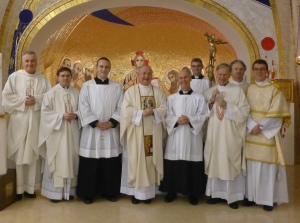Ministry of Reader 2014
Posted on 17. Nov, 2014 in Carousel

Left to right: Monsignor Ciarán O’Carroll (Rector), Fr Hugh Clifford (Director of Formation), Mr Brian O’Driscoll (new Reader), Bishop Raymond Field (celebrant), Mr James Daly (new Reader), Mr Stephen Duffy (Master of Ceremonies for the Mass), Fr Thomas Norris (Spiritual Director), Fr George Hayes (Vice Rector), and Rev. Aidan McCann (Deacon for the Mass).
At a Mass celebrated in the College Chapel of the Pontifical Irish College, Rome, on Monday, 17th November 2014, two seminarians of the College, Mr James Daly (Archdiocese of Dublin) and Mr Brian O’Driscoll (Diocese of Cork and Ross) were instituted to the Ministry of Reader by Most Rev. Dr Raymond Field, Auxiliary Bishop of Dublin.
To view more photographs from the occasion, click here.
The Ministry of Reader is a Church ministry in itself, but it is also one of the steps along the way in formation for the Priesthood.
Here is the description of the Ministry of Reader from the Apostolic Letter, ‘Ministeria quaedam’ of Blessed Pope Paul VI (August 15, 1972):
‘The reader is appointed for a function proper to him, that of reading the word of God in the liturgical assembly. Accordingly, he is to read the lessons from sacred Scripture, except for the Gospel, in the Mass and other celebrations; he is to recite the psalm between the readings when there is no psalmist; he is to present the intentions for the general intercessions in the absence of a deacon or cantor; he is to direct the singing and the participation of the faithful; he is to instruct the faithful for the worthy reception of the sacraments. He may also, insofar as necessary, take care of preparing other faithful who by a temporary appointment are to read the Scriptures in liturgical celebrations. That he may more fittingly and perfectly fulfill these functions, let him meditate assiduously on sacred Scripture.
Let the reader be aware of the office he has undertaken and make every effort and employ suitable means to acquire that increasingly warm and living love and knowledge of Scripture that will make him a more perfect disciple of the Lord.’
